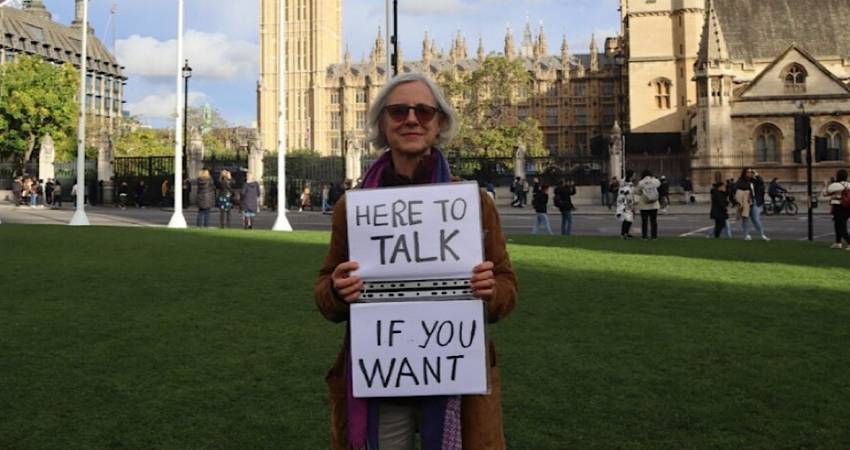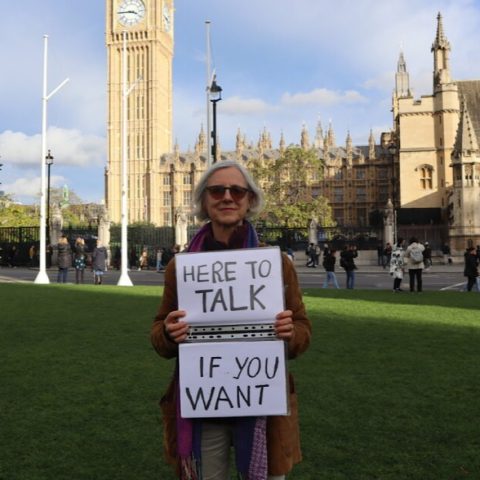
Britain: MPs call on Home Office to allow conversation and prayer outside abortion centres
A group of British MPs have called on the Home Office to protect consensual conversation and silent prayer in buffer zones outside abortion centres, after a UK woman was charged for holding a sign.
Five cross-party politicians, including four MPs and one peer, called out “censorship” faced by retired medical scientist, Dr Livia Tossici-Bolt. The 62-year-old is being prosecuted in a free speech test case for holding a sign close to an abortion centre which read: “Here to talk if you want to.”
Tossici-Bolt, who worked as a medical researcher at Southhampton’s University Hospital Trust, stands accused of breaching a “buffer zone” at the abortion centre in Bournemouth. She faces trial after refusing to pay a fixed penalty notice issued by the local council over the alleged breach of a public space protection order (PSPO) which created the buffer zone.
Dr Livia Tossici-Bolt (Credit: ADF)
She has refused to pay the fine, and has claimed she did not breach the PSPO. Ms Tossici-Bolt, a Christian, also insists her right to freedom of expression is protected under Article 10 of the European Convention on Human Rights, to offer consensual conversations. The retired scientist has said that several women approached her to talk about the issues they were facing.
MPs Sir Edward Leigh, Andrew Lewer, Carla Lockhart, Andrew Bridgen, and British Peer, Lord Jackson, are behind the call for the Home Office to permit conversation and prayer outside Britain’s abortion facilities. The politicians say that the case highlights “double standards” around free speech and law enforcement in the UK.
Reacting to Dr Tossici-Bolt’s case, senior Tory MP and former minister Sir Edward Leigh said: “Freedom of thought and freedom of speech are the bedrock of a free society, adding:
“It’s mad that a retiree is facing trial for inviting people to have a harmless chat. No one should be turned into a criminal just for peacefully offering to talk to people in a public space.
“All our warnings about the effect buffer zones would have on free speech have come true. We’ve seen a woman arrested twice for thinking and a Catholic priest charged and prosecuted. Both won in the courts but only after a long and needless legal battle that will have a chilling effect on free speech,” Sir Edward said.
Conservative peer Lord Jackson said the case was “disgraceful and embarrassing,” stating:
“It’s astonishing that people of faith offering silent prayers on a matter of conscience are stigmatised, harassed and criminalised.
“An obvious example of dual policing. All under a Conservative Government. Disgraceful and embarrassing.”
Independent MP Andrew Bridgen said:
“There should not be double standards when it comes to free speech. Yet, repeatedly, we see evidence that Christian expression is harshly censored, while the right to voice more fashionable views is protected.”
PSPOs have been widely criticised by free speech campaigners, as well as politicians, for their censorious effects on free speech, thought, and religious liberty. Defenders of “buffer zones” often say they are intended to prevent harassment—but harassment is already a crime, making the existence of “buffer zones” unnecessary and malign.
“Buffer zones” are to be rolled out around abortion centres across the country as part of the Public Order Act 2023. Draft Home Office guidance clarified that silent prayer and consensual conversation would be protected in “buffer zones”, but two MPs—one Conservative and one Labour—have pushed for even these to be censored.”
DUP MP Carla Lockhart, meanwhile, said that British law enforcement, who already have limited resources, must focus on “real crimes instead of entirely benign behaviour,” as she slammed the treatment of Ms Tossici-Bolt.
“Livia’s case underlines the urgent need for the Home Secretary’s guidance on buffer zones to safeguard consensual conversations,” the NI politician said.
“It must also safeguard silent prayer—other cases, such as that of Isabel Vaughan-Spruce who was arrested, interrogated, charged, and prosecuted before eventually being vindicated for her thoughts, show the dystopian consequences of criminalising this.
“No one should want to live in a society where the state has the power to say what you can or can’t think, or what peaceful interactions you can or can’t have with others.”
In November, TDs voted overwhelmingly to enact buffer zones within 100 metres of facilities providing abortions. The Safe Access Zones Bill, which passed by 117 votes to 10, outlaws any type of activity that may be construed as seeking to influence or interferein any manner with a woman’s intention to have an abortion.
Only ten TDs voted against the Bill: Aontú’s Peadar Tóibín, and Independents Mattie McGrath, Danny Healy-Rae, Michael Healy-Rae, Peter Fitzpatrick, Noel Grealish, Michael Collins, Richard O’Donoghue, Seán Canney, and Michael Lowry.
Prior to the passing of the legislation, a number of TDs raised concerns over its implications for freedom of speech.
Deputy Peadar Tóibín said that he would “always support the right to protest” and the right to freedom of speech.
“It is more important to support those fundamental democratic rights when you do not agree with it. Supporting those rights only when they are in sympathy with your views is not what democracy is about,” he told TDs.
The legislation has sparked concern and discussion from advocacy groups and legal experts, with Barrister Grace Sullivan writing in the Bar Review in June that the ‘safe access’ zones proposals, along with hate speech legislation, would “criminalise religious speech, even potentially where there is no identifiable victim.”
Maria Maynes
This article was printed in gript and is published here with permission
Featured
- Man jailed for 9 years for forced abortion
- Abortion coercion has arrived in Ireland – the NWC are silent
- Review of at-home abortions 'needed after coercion case'
- French Govt to remind 29-year-olds of biological clock
- Huge factor in decline in primary school numbers ignored
- Germany Denies Promoting Abortion Abroad—While Funding Pro-Abortion NGOs
- Govt don’t oppose Coppinger abortion bill at 1st stage
- March for Life: Vance, the White House, and a Divided Pro-Life Movement
- Paris’ Annual March for Life Puts Euthanasia in the Spotlight
- Britain’s seemingly limitless abortion rate
- The importance of the work carried out by Every Life Counts
- Puerto Rico officially recognizes unborn children as ‘natural persons’
- Assisted suicide laws stalled by “complex” legal issues
- Yes, that hideous celebration of 300 abortions is real
- White Crosses Memorial: Dungarvan once again pays its respects to our aborted babies
- Josiah: Abortion Survivor
- Rally for Life 2025
You can make a difference.
DONATE TODAY
